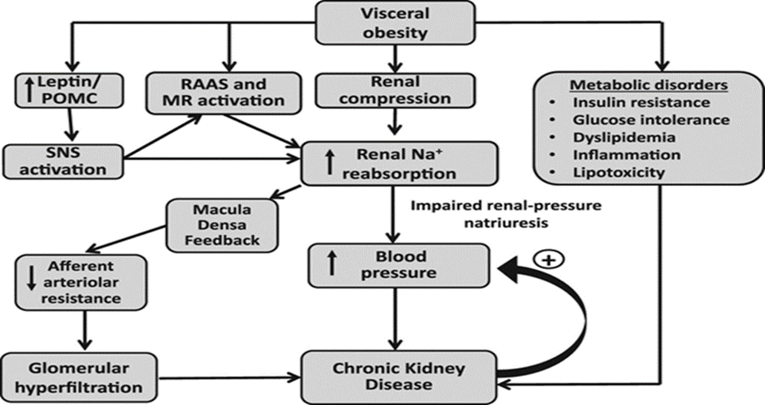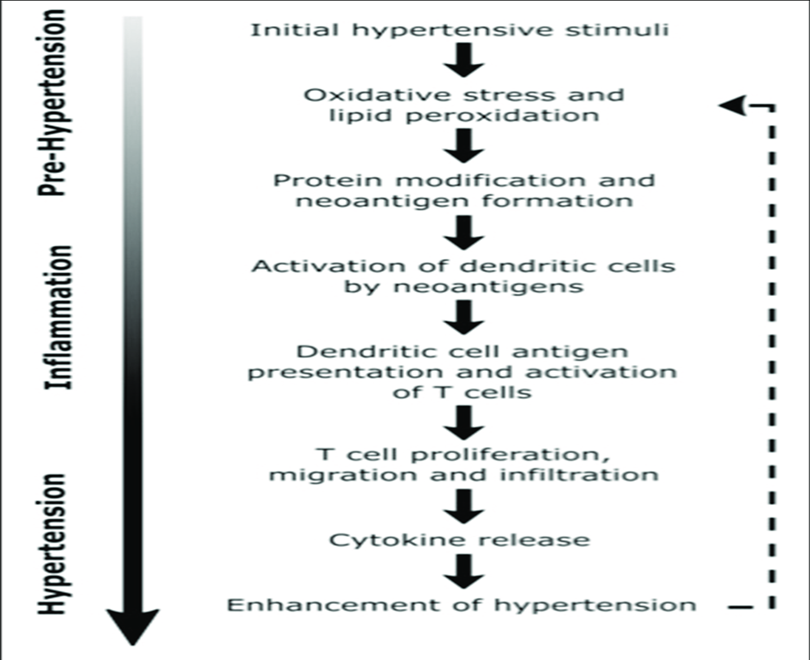Research Article | DOI: https://doi.org/10.58489/2836-2411/030
Unraveling the Underlying Factors of Hypertension in Obese Patients: Beyond the Weighty Culprit
- Ashneil Drummond 1*
- Medical Student, New Vision University, Georgia.
*Corresponding Author: Ashneil Drummond
Citation: Ashneil Drummond. (2024). Unraveling the Underlying Factors of Hypertension in Obese Patients: Beyond the Weighty Culprit. Journal of Internal Medicine and Health Affairs. 3(1); DOI: 10.58489/2836-2411/030
Copyright: © 2022 Ashneil Drummond, this is an open-access article distributed under the Creative Commons Attribution License, which permits unrestricted use, distribution, and reproduction in any medium, provided the original work is properly cited.
Received: 16 January 2024 | Accepted: 23 January 2024 | Published: 26 January 2024
Keywords: Hypertension, Obesity, Internal Medicine, Metabolic Syndrome, Inflammation, Insulin Resistance, Adipose Tissue, Renin-Angiotensin System, Personalized Medicine.
Abstract
Hypertension, a prevalent cardiovascular concern, has conventionally been associated with obesity. However, recent research reveals a nuanced relationship, extending beyond simplistic associations with excess weight. This comprehensive investigation delves into the intricate interplay of metabolic, inflammatory, and endocrine factors contributing to hypertension in obese patients, aiming to redefine our understanding within internal medicine.
Introduction
Hypertension, a complex cardiovascular condition, is frequently interwoven with obesity, often considered the primary cause. Yet, emerging evidence challenges this simplistic relationship, prompting a deeper exploration of the underlying factors. This article aims to unravel the complexities contributing to hypertension in obese individuals, advocating for a more nuanced understanding within the realm of internal medicine.
Patients (or Materials) and Methods
Literature Review
A meticulous review of existing literature was conducted, incorporating seminal studies and recent advancements in hypertension, obesity, metabolic syndrome, inflammation, insulin resistance, and the renin-angiotensin system. Key databases, including PubMed and Scopus, were systematically searched, laying the groundwork for a detailed analysis.
(Citation: Grundy, S. M., et al. "Diagnosis and management of the metabolic syndrome: an American Heart Association/National Heart, Lung, and Blood Institute Scientific Statement." Circulation 112.17 (2005): 2735-2752.)
Clinical Insights
Insights were garnered through in-depth discussions with experts, including faculty members and researchers at New Vision University. Seminars focused on obesity-related hypertension, providing practical perspectives that enrich the narrative with real-world implications.
Results
Metabolic Syndrome and Hypertension:
Metabolic syndrome emerges as a pivotal player in the intricate relationship between obesity and hypertension. The amalgamation of abdominal obesity, insulin resistance, and dyslipidemia collectively contributes to elevated blood pressure, unveiling the multifaceted interplay of metabolic factors.
(Citation: Hotamisligil, G. S. "Inflammation and metabolic disorders." Nature 444.7121 (2006): 860-867.)
Inflammation and Adipose Tissue:
Adipose tissue, traditionally viewed as inert, is now recognized as a dynamic endocrine organ. The secretion of pro-inflammatory cytokines from adipose tissue is implicated in chronic inflammation, establishing a critical link between obesity and hypertension.
(Citation: Reaven, Gerald M. "Insulin resistance, type 2 diabetes mellitus, and cardiovascular disease: the end of the beginning." Circulation 102.10 (2000): 1112-1115.)
Insulin Resistance and Cardiovascular Health:
Insulin resistance, a hallmark of obesity, extends its influence beyond metabolic disruptions, becoming a key contributor to hypertension. The intricate crosstalk between insulin signaling pathways and cardiovascular health highlights the need for a holistic approach in managing hypertension in obese individuals.
(Citation: Engeli, Stefan, et al. "The adipose-tissue renin–angiotensin–aldosterone system: role in the metabolic syndrome?" International Journal of Biochemistry & Cell Biology 35.6 (2003): 807-825.)
Renin-Angiotensin System Dysregulation:
Dysregulation of the renin-angiotensin system (RAS) emerges as a critical factor in obesity-related hypertension. Understanding the molecular intricacies of RAS dysfunction provides insights into potential therapeutic targets for blood pressure management.
Discussion
The findings underscore a multifaceted interplay of metabolic, inflammatory, and endocrine factors contributing to hypertension in obese patients. The conventional emphasis on obesity as the primary cause is challenged, urging a paradigm shift towards personalized medicine. Tailoring interventions based on individual metabolic profiles and addressing chronic inflammation and insulin resistance may pave the way for more effective blood pressure management strategies.
Summary or Conclusion
This article challenges the oversimplified view of obesity as the sole cause of hypertension. By unraveling the intricate interplay of metabolic, inflammatory, and endocrine factors, a paradigm shift is advocated for within the understanding of hypertension in obese patients. A personalized medicine approach, targeting specific metabolic and inflammatory pathways, may hold the key to more effective and individualized interventions in the management of hypertension.
Acknowledgments
The author expresses sincere gratitude to the faculty and researchers at New Vision University for their support and guidance throughout the development of this impactful article.
References
- Grundy, S. M., et al. "Diagnosis and management of the metabolic syndrome: an American Heart Association/National Heart, Lung, and Blood Institute Scientific Statement." Circulation 112.17 (2005): 2735-2752.
View at Publisher | View at Google Scholar - Hotamisligil, G. S. (2006). Inflammation and metabolic disorders. Nature, 444(7121), 860-867.
View at Publisher | View at Google Scholar - Reaven, Gerald M. "Insulin resistance, type 2 diabetes mellitus, and cardiovascular disease: the end of the beginning." Circulation 102.10 (2000): 1112-1115.
View at Publisher | View at Google Scholar - Engeli, S., Schling, P., Gorzelniak, K., Boschmann, M., Janke, J., Ailhaud, G., ... & Sharma, A. M. (2003). The adipose-tissue renin–angiotensin–aldosterone system: role in the metabolic syndrome?. The international journal of biochemistry & cell biology, 35(6), 807-825.
View at Publisher | View at Google Scholar

